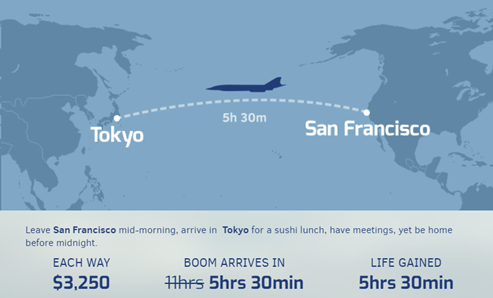Here is a neat marketing hook: Fly from New York to London for midday meetings. Be home in time to tuck your kids into bed, writes Jon Markman, editor of The Power Elite and Tech Trend Trader.
To make this possible, Boom Supersonic is building airplanes that will flit across the globe at 1,451 mph. For those of us who are physics-challenged, that is Mach 2.2…or 2.6 times faster than every other commercial airliner.
It all might seem far-fetched. It’s not. Breakthroughs in aerospace are happening every day. Investors need to begin positioning now.
There is a good reason for the hectic pace of discovery. I call it the New Gilded Age. That is a throwback to a bygone era of invention. Then, entrepreneurs were inspired by electricity and industrialization. They changed the world and built massive fortunes.
Today, something even bigger is happening…
This is the age of the supercomputer and hyperconnectivity. Imagine what is possible when the brightest minds have access to unlimited computing power. Now imagine a continuous stream of data feeding artificial intelligence algorithms.
Already, chemists have used these tools to develop new materials. Biologists have edited genes to slow the aging process and fight deadly diseases. Mechanical engineers have pushed design to new heights.
Really cool new ideas are jumping off the drawing board.
That’s essentially the story of Boom Supersonic. The company says advances in aerodynamic design, material science and super cruise propulsion mean its Mach 2.2 jetliner is poised to become reality.
And there are buyers already waiting in line for it…

Image credit: BoomSupersonic.com
Imagine flying to Tokyo and back in the same amount of time it currently takes to fly one-way!
Japan Airlines (JAPSY) announced pre-orders for 20 of the new aircraft Dec. 5. It also committed to invest in development, joining Virgin Group as a strategic investor.
Airlines have always been intrigued by speed. Concorde, a British-French supersonic jetliner, began shuttling the rich and famous between New York and London in 1976. However, the aircraft was plagued with mechanical issues. And its military twin turbojet engines were notoriously thirsty, not to mention noisy.
Boom’s concept borrows the familiar delta wing from Concorde. But engineers used computer modeling, data analytics and a new propulsion system to quiet the 55-seat aircraft. Three new General Electric (GE) turbojets will also sip fuel. The planes should be so efficient, the company claims airlines will be able to compete on price with current business class fares.
It’s a bold claim. However, the team has plenty of success conquering big problems in aerospace. Among other projects, the corporate website lists contributions to SpaceX Falcon 9, the F-35 Joint Strike Fighter and autopilot software on the Boeing 787.
The opportunity for investors is the ecosystem. A project of this scope requires a rethinking of air travel.
Related story: Software Takes Flight at Airlines. How to Book Gains
I have been pointing my newsletter members toward one of the largest seating companies in the world. Long ago, its managers began to think about what travel would look like in an era of autonomous vehicles, fast planes and trains.
Oddly, the answer was very different.
The company invested heavily in new materials. They are cheaper to make, yet have the look and feel of natural materials like leather and suede. It also ramped-up automation.
Currently, vehicle interiors require hours of tedious hand-sewing. Custom robots reduce human labor substantially, while increasing production. The result is higher operating margins.
The other big opportunity is software. As machines get smarter, software is more important than ever. Recent advances in artificial intelligence play into the hands of a particular Silicon Valley company.
While others were trying to build bolt-on, software-as-a-service businesses, this company was building a new way to solve larger problems. Today, it is at the center of the movement. And it is now supplying the software and hardware that engineers will use to build the next generation of intelligent machines.
If all goes according to plan, Boom will have a 1/3-scale concept ready for test flights next year. Supersonic jetliners are going to happen.
The time for investors to buy a ticket to ride this is now. I’ll keep you posted on the public companies to consider as a bet on Boom in coming months.
Best wishes,
Jon Markman
Subscribe to Jon Markman’s Power Elite newsletter here
Subscribe to Jon Markman’s Tech Trend Trader here
Subscribe to Jon Markman’s Strategic Advantage here











